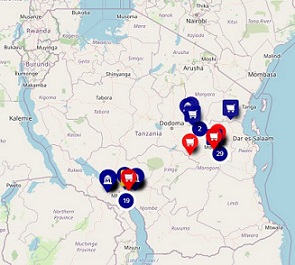Since February 2014 MVIWATA in partnership with a French organization called TAMADI commenced a rural tourism initiative in which rural tourists from France and Belgium have been visiting villages of Tanzania. The initiative was established with the aim of empowering smallholder farmers to promote cooperation and solidarity, knowledge and awareness on socio-economic and cultural practices between travelers and local communities through rural tourism.
In 2014 when the initiative was established MVIWATA welcomed 38 travellers, following 43 travelers in 2015, 53 travellers in 2016, 64 travellers in 2017 and until the end of July in 2018 the project has already received 44 travellers. Therefore this makes 242 travellers as of July 2018 since the establishment of the initiative in 2014.
Objectives of the initiative:
a). To provide capital to rural communities involved in the initiative.
b). To promote intercultural exchanges while promoting the culture of small holder farmer of Tanzania to the visitors.
c). To promote protection of indigenous culture and environment.
The initiative gives travelers an opportunity to stay with local communities and share daily activities, experiences, traditions and customs that are protected by society. These exchanges are exciting and unique to both travelers and local communities as they provide different perspectives of life among them.
Bi Kijani (Member of MVIWATA through Mlidhani Hatuwezi farmers group) preparing sea weeds in her farm with travelers from France in Pongwe village Zanzibar.
Outcomes of the Rural Tourism Initiative.
a). Construction of toilets in Kwalei primary school Bumbuli Districts and in households that hosts travelers in Kimokouwa village Namanga, Arusha.
b). Housing improvements such as repairing house floors, walls paintings and purchase of domestic appliances such as beds, mattresses, tables and cooking utensils for thirty six households hosting travelers to the moment. Thus increasing hygiene and sanitation in families.
c). Strengthening of MVIWATA’s local networks by building offices for example UUWANO in Namanga Arusha, contributing operation costs in Kinole, Zanzibar and Kwalei local networks and initiation of economic projects for example milk processing in JUWAWAKULIMA farmers network in Zanzibar.
d). Increasing income to small-scale farmers households hosting travelers in rural areas through provision of services like food, shelter, showcasing cultural practices, selling of handicrafts and also through seasonal jobs for translators and local guides in rural areas.
Initiative’s implementation areas;
MVIWATA is implementing this initiative in sixteen villages in the country, namely Tchenzema, Tandai, Kalundwa and Kigugu villages in Morogoro, Chamkoloma in Dodoma, Majengo in Manyara, Kimokouwa, Eorendeke and Lesoit in Namanga Arusha, Shirimatunda, Shirimgungani and Shirinjoro in Kilimanjaro, Kwalei and Kwekanga in Tanga, and Pongwe and Uroa villages in Zanzibar.
Travellers from France participating in making Maasai bracelets with residents of Kimokouwa village in Namanga Arusha
Types of itineraries;
The project currently has three types of itineraries.
- Twenty two (22) days itinerary
This itinerary gives travelers an opportunity to stay with local communities in five villages and a visit to two National Parks namely Tarangire, Mikumi and Selous Game Reserve.
- Fifteen (15) days itinerary
This itinerary gives travelers an opportunity to stay with local communities in three villages and a visit to three National Parks namely Tarangire, Mikumi and Udzungwa National Parks.
3. Twelve (12) days youth itinerary
This itinerary gives young travelers an opportunity to stay in two villages with youth groups that are engaged in agro-ecology in schools as well as a visit in the Mikumi National Park.
Grinding millet by traditional stones a local activity for travelers from Europe together with local communities in Majengo village Babati, Manyara Region









